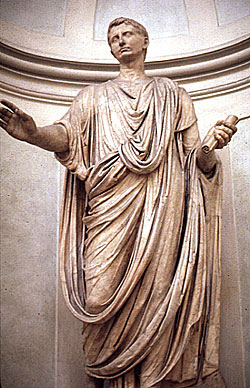
Feastday: April 18
Death: 185
Martyr whose Apologia, or defense of the faith, is considered one of the most priceless documents of the early Church. Apollonius was a Roman senator who was denounced as a Christian by one of his slaves. The Praetorian Prefect, Sextus Tigidius Perennis, arrested him, also putting the slave to death as an informer. Perennis demanded that Apollonius denounce the faith, and when he refused, the case was remanded to the Roman senate. There a debate took place between Perennis and Apollonius that clearly outlines the beauty and the value of Christianity. Despite his eloquent defense, Apollonius was condemned and beheaded.
Christian martyr and apologist For 4th-c martyr, see Apollonius of Rome.Saint Apollonius the Apologist or Saint Apollonius of Rome (died 21 April 185) was a 2nd-century Christian martyr and apologist (not to be confused with Apollinaris Claudius, another contemporary apologist) who was martyred in 185 under the Emperor Commodus (161-192).
Life
Four different sources speak of Saint Apollonius of Rome:
- a record of the trial incorporated into the Ecclesiastical History of Eusebius of Caesarea (265-340);
- chapters 40 and 42 of the De Viris Illustribus by Saint Jerome (347-420),
- two versions of the Passio of Apollonius, one Greek, the other Armenian, which were discovered in the late 19th century.
These sources present Apollonius as an illustrious Roman, even, it seems, a senator, and an exceedingly talented man, well versed in philosophy. He was denounced as a Christian to the Pretorian Prefect Perennius. Summoned to defend himself, he read to the senate, according to Saint Jerome, "a remarkable volume" in which, instead of recanting, he defended the Christian faith. As a result, he was condemned to death on the basis of the law established by the Emperor Trajan.
The sources say he was subjected to two investigations, the first by the Prefect Perennius, the second, three days later, by a group of senators and jurists. The hearings were conducted in a calm and courteous manner. Apollonius was permitted to speak with only rare interruptions, aimed at getting him to tone down his remarks, which were making him liable to punishment.
Apollonius was not afraid to die, because, he said: "There is waiting for me something better: eternal life, given to the person who has lived well on earth." And he argued for the superiority of Christianity's concepts of death and life.
The sources disagree on the manner of his death. The Greek Passio says he died after having his legs crushed, a punishment inflicted also on the slave who denounced him; but in the Armenian account he is decapitated.
Veneration
Apollonius was not mentioned in the earliest Christian martyrologies, not being at first the object of individual commemoration. In the Middle Ages he was confused with two other saints, Apollo of Alexandria and the Apollonius who was martyred with Saint Valentine and whose feast is on 18 April. As a result, this date was attributed also to Saint Apollonius of Rome, even in editions of the Roman Martyrology, the latest editions of which have, however, restored the date of 21 April.
The account in the Roman Martyrology (21 April) is as follows:
- At Rome, commemoration of Saint Apollonius, philosopher and martyr. Under the Emperor Commodus, he defended, before the Prefect Perennius and the Senate, the cause of the Christian faith in a finely argued address, and then, after being condemned to death, confirmed it by the witness of his blood.

